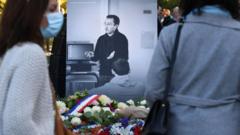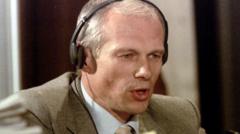Breyten Breytenbach, the influential South African poet and former political prisoner known for his staunch opposition to apartheid, has passed away at the age of 85 in Paris. His literary career, marked by poignant poetry written in Afrikaans and prose reflected in English, served as a powerful critique of the apartheid regime that imprisoned him.
Breyten Breytenbach: The Legacy of a South African Exile Poet

Breyten Breytenbach: The Legacy of a South African Exile Poet
Renowned anti-apartheid writer Breyten Breytenbach dies at 85, leaving behind a powerful legacy of literary resistance and personal sacrifice.
Breytenbach's life was shaped by his experiences of systemic injustice in South Africa, which began with his marriage to a Vietnamese woman, Hoang Lien Ngo, whom the apartheid laws barred from entering the country. This personal struggle fueled his artistic expression, leading him to exile in France, where he continued to speak out against the oppressive regime.
As a figure often regarded as the leading poet in the Afrikaans language, Breytenbach utilized his art to confront and challenge the societal norms of his homeland. His most celebrated work, "The True Confessions of an Albino Terrorist," chronicles his life as a political prisoner, revealing the psychological toll exacted by years of incarceration, including time spent in solitary confinement.
Throughout his life, Breytenbach was critical of the use of Afrikaans as a language of oppression. He famously stated, "To be an Afrikaner is a political definition," highlighting the ethnic and racial tensions that defined much of South African history. Despite living away from his home country for decades, his commitment to truth and justice resonated within the literary and social landscape.
Joseph Lelyveld, former South Africa bureau chief for The New York Times, praised Breytenbach’s memoir, asserting it was a work of deep emotional resonance that reflected the author's profound struggles. Breytenbach's voice remains an integral part of the dialogue on race, identity, and artistic expression in South Africa and beyond, continuing to inspire future generations of writers and activists.
As a figure often regarded as the leading poet in the Afrikaans language, Breytenbach utilized his art to confront and challenge the societal norms of his homeland. His most celebrated work, "The True Confessions of an Albino Terrorist," chronicles his life as a political prisoner, revealing the psychological toll exacted by years of incarceration, including time spent in solitary confinement.
Throughout his life, Breytenbach was critical of the use of Afrikaans as a language of oppression. He famously stated, "To be an Afrikaner is a political definition," highlighting the ethnic and racial tensions that defined much of South African history. Despite living away from his home country for decades, his commitment to truth and justice resonated within the literary and social landscape.
Joseph Lelyveld, former South Africa bureau chief for The New York Times, praised Breytenbach’s memoir, asserting it was a work of deep emotional resonance that reflected the author's profound struggles. Breytenbach's voice remains an integral part of the dialogue on race, identity, and artistic expression in South Africa and beyond, continuing to inspire future generations of writers and activists.




















